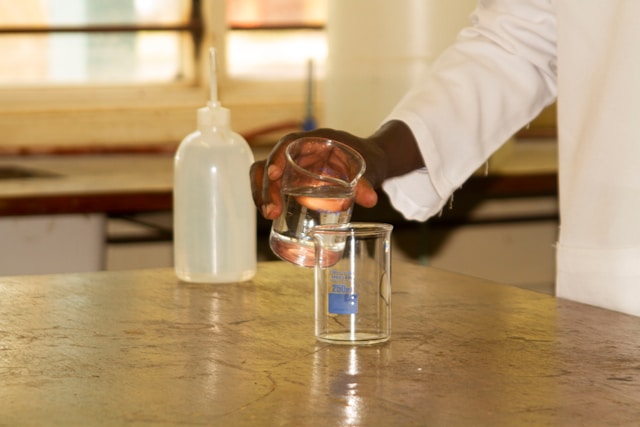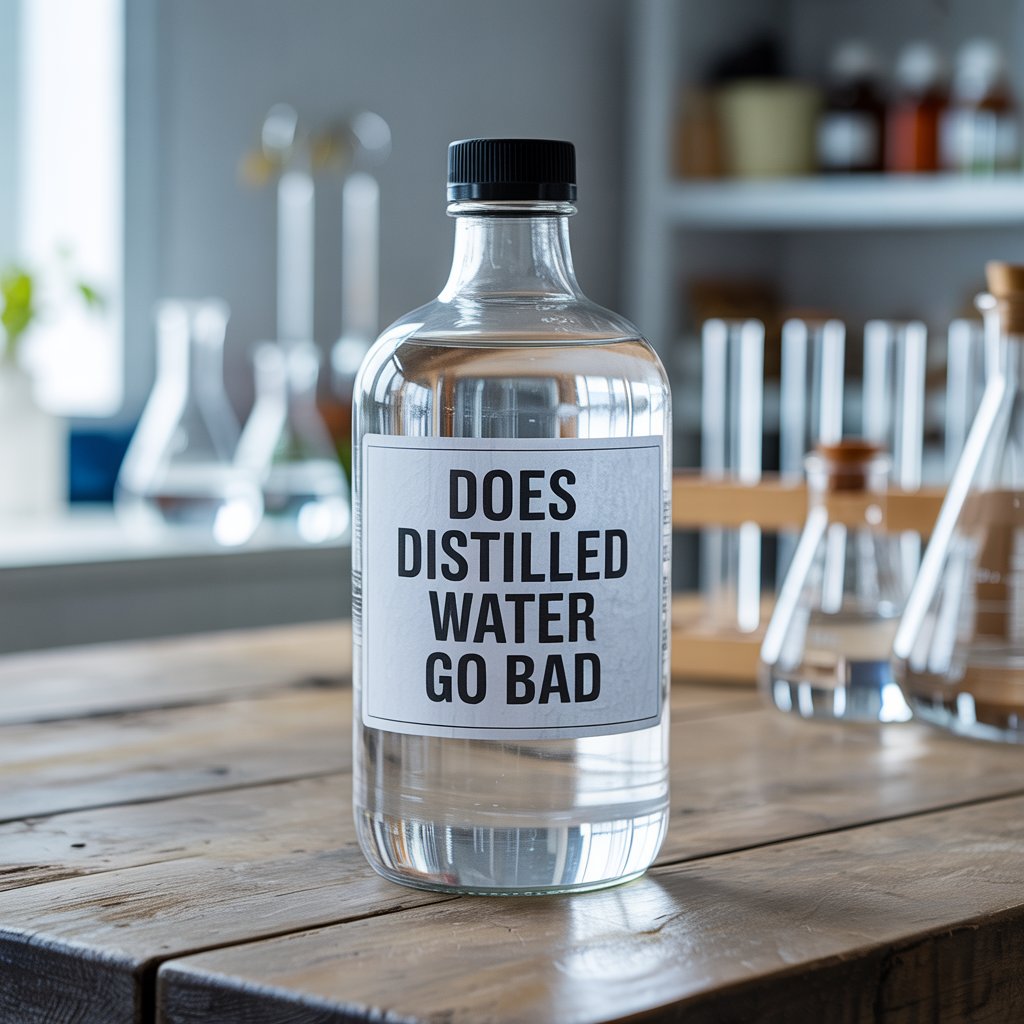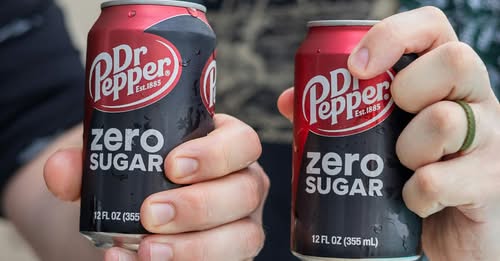Does distilled water go bad? It’s a question that comes up often—especially when a forgotten jug is found tucked away in the back of a pantry or garage. Distilled water is praised for its purity, used in everything from CPAP machines and baby formula to survival kits and lab equipment. But despite being free of minerals, bacteria, and contaminants, it isn’t immune to degradation. Over time, exposure to air, light, and poor storage conditions can compromise its safety.
In this guide, you’ll learn whether distilled water can truly go bad, the science behind it, how to identify unsafe water, and expert-backed tips on when it’s time to toss it out. If you care about your health and hydration, this is essential reading.

What Is Distilled Water and Why Is It Used So Widely?
Distilled water is produced by boiling water into vapor and then condensing it back into liquid in a separate container. This process removes minerals, salts, bacteria, and most other impurities.
It’s used for:
- Drinking (especially by those with kidney issues or on strict mineral-free diets)
- CPAP machines and humidifiers
- Medical applications and laboratory settings
- Automotive cooling systems
- Food and drink manufacturing
Despite its purity, distilled water isn’t immune to degradation once exposed to the environment.
Does Distilled Water Go Bad? The Scientific Verdict
Technically, distilled water doesn’t go bad in the way milk or meat does. But that doesn’t mean it stays safe to drink indefinitely.
Here’s what happens over time:
- Absorbs CO₂: Distilled water left open to air will absorb carbon dioxide, forming carbonic acid. This lowers its pH and can slightly alter its chemical profile.
- Microbial contamination: Once opened, airborne bacteria, mold spores, or contact with dirty containers can introduce microorganisms.
- Plastic leaching: If stored in low-grade plastic for too long or in high temperatures, chemicals from the container may leach into the water.
Opened vs. Unopened Distilled Water :
| Factor | Opened Distilled Water | Unopened Distilled Water |
| Shelf Life | 1–2 weeks (refrigerated) | Up to 2 years |
| Risk Level | Medium (contamination risk) | Low (sealed, clean) |
| pH Stability | Decreases over time | Remains stable |
Clear Signs Your Distilled Water Is Unsafe to Use
Look for these red flags:
- Cloudiness or floating particles
- Off smell – plastic, mildew, or sour odors
- Algae or slime film inside container
- Strange taste
- Container damage – bloated bottles, discoloration, or cracking
If you see or smell any of the above, it’s safest to pour it down the drain.
When to Toss It: Storage Guidelines You Shouldn’t Ignore
Use the following guidelines to know when it’s time to toss your distilled water:
- Opened bottles: Discard after 1–2 weeks if not refrigerated
- Stored in sunlight: Toss it even if unopened – UV rays can damage the container and encourage microbial growth
- Reused containers: Higher chance of contamination; avoid storing for long
- For babies or medical use: Always use fresh, unopened bottles only
Pro Tip: Never store distilled water in reused plastic milk jugs or soda bottles. Use food-grade, airtight containers only.
What Makes Distilled Water Go Bad Faster?
- Air exposure: Introduces dust, microbes, and CO₂
- Heat and light: UV exposure breaks down some plastics and fosters algae growth
- Poor-quality containers: Some plastics release chemicals over time
- Unclean dispensers: Water coolers and humidifiers may harbor bacteria
Scientific Insight: Studies show that water left open to air for extended periods becomes more acidic and prone to contamination, especially when stored in polyethylene bottles.
How to Store Distilled Water Properly
- Use airtight glass or BPA-free HDPE containers
- Store in a cool, dark place (ideally under 77°F or 25°C)
- Refrigerate after opening
- Label containers with the date opened
- Don’t store near chemicals or food with strong odors
Can You Reuse Distilled Water? Risks and Realities
You may be tempted to reuse leftover distilled water from a humidifier or CPAP machine. That’s risky.
Why?
- Bacteria thrive in warm, moist environments
- Algae can grow in standing water
- Reusing may spread mold or mildew
Safe reuse practices:
- Sterilize containers and equipment before each refill
- Avoid reusing water for medical or drinking purposes
- Only reuse for cleaning or non-health applications
Distilled vs. Other Waters: Does Spring or Purified Water Go Bad Too?
| Type | Shelf Life | Storage Needs | Health Risks When Expired |
| Distilled | 1–2 years unopened | Dark, cool, sealed | Low to Medium |
| Purified | 6–12 months | Same as above | Medium |
| Spring | 6 months | Refrigerate if opened | Medium-High |
| Tap | N/A | Use immediately | High if stored improperly |
Spring and purified waters contain minerals, which can support microbial growth over time. Distilled water lacks minerals but isn’t immune to contamination.
Lab Tests: How Professionals Assess Water Purity
In clinical, laboratory, or food-grade environments, distilled water is subject to strict quality assurance. Here’s how professionals verify its purity:
- TDS Meters: These tools measure total dissolved solids. Pure distilled water typically has a TDS value between 0–2 ppm. Higher values indicate contamination or impurities.
- pH Meters: A calibrated pH meter is used to ensure the water remains near neutral pH (6.5–7.5). A lower pH suggests CO₂ absorption or chemical degradation.
- Microbial Culture Kits: In a controlled lab setting, samples are incubated to check for bacterial, fungal, or mold presence. Even a sterile appearance can harbor microorganisms.
- Spectrophotometers: These instruments analyze water for trace chemicals or heavy metals by measuring light absorption across specific wavelengths. They are essential in pharmaceutical and food-grade water validation.
These lab-grade methods confirm whether distilled water meets medical, laboratory, or industrial standards before use.
DIY Testing for Distilled Water Safety at Home
You don’t need a lab to assess the safety of your distilled water. With simple, affordable tools, you can check for purity and early signs of contamination:
- TDS Meter: These portable digital devices can be bought online for under $20. Distilled water should read 0–2 ppm. Readings above 10 ppm suggest possible contamination or mineral exposure.
- Visual & Smell Inspection: Hold your container against light. Look for suspended particles, discoloration, or cloudiness. Any sour or plastic-like odor is a red flag.
- pH Test Strips: Available in most pharmacies, these strips can detect pH levels outside the safe range. Water that turns the strip orange (acidic) may have absorbed CO₂ or been contaminated.
- Check the Container: Cracks, bloating, or discoloration in plastic containers may indicate chemical breakdown. Always inspect lids and seals.
These DIY methods won’t replace professional tests but are effective for routine home safety checks—especially for drinking or baby formula use.
Myths About Distilled Water Going Bad – Busted
- “Distilled water lasts forever” → False. Exposure to air degrades it over time.
- “Bad distilled water turns toxic” → Not unless it’s chemically or biologically contaminated.
- “You can store it in any bottle” → Wrong. Container material matters.
- “Boiling fixes everything” → Not true for chemical contamination or plastic leaching.
Can Distilled Water Be Used for Emergency Prep?
Yes, distilled water is ideal for emergency storage due to its purity. But:
- Store it in sealed, food-safe containers
- Rotate supply every 6–12 months if opened
- Label clearly with the date of storage
- Avoid direct sunlight and heat exposure
Use for:
- Drinking
- Medical emergencies
- Baby formula (if unopened)
Cost-Saving Tips for Buying and Storing Distilled Water
- Buy in bulk: Gallon jugs are cheaper per ounce
- Store in reusable HDPE or glass jugs
- Use a water distiller at home: Save money over time
- Monitor sales at pharmacies or grocery chains
- Avoid buying flavored or mineral-enhanced variants labeled as distilled
Expert Quotes and Sources
- CDC on water hygiene: “Improperly stored water can become a vehicle for disease-causing organisms.” (CDC, Emergency Water Supply Planning Guide)
- WHO on waterborne illness: “Microbial contamination of drinking water is a significant contributor to disease worldwide.” (WHO Guidelines for Drinking-water Quality)
- NSF/EPA guidance: “Use containers that are made of food-grade plastic or glass to prevent leaching.” (NSF International/EPA Safe Drinking Water Standards)
Frequently Asked Questions (FAQs)
Q1. Can bacteria grow in distilled water?
Yes, if it’s been opened or stored improperly.
Q2. Is it safe to drink distilled water after a year?
Only if the container is sealed, stored properly, and free from signs of spoilage.
Q3. Can expired distilled water make you sick?
Yes, if it’s contaminated with bacteria, mold, or chemicals from degraded plastic.
Q4. How to test if your stored water is still good?
Look for clarity, check for odor, and inspect the container.
Q5. Can I boil old distilled water to make it safe again?
Boiling may kill bacteria, but won’t remove chemical contamination or fix altered taste.
Key Takeaways: Know When to Keep or Toss
- Does distilled water go bad? Yes, under poor storage—here’s how to stay ahead:
- Distilled water can degrade in quality, especially after opening
- Store it in sealed, dark, and cool conditions
- Don’t drink it if it smells, looks, or tastes strange
- Proper storage = longer shelf life and peace of mind
Final Thoughts: Clean Water = Clean Health
Does distilled water go bad if stored improperly? Absolutely. Even the purest water needs the right conditions to remain safe over time.
Water is life, but only if it’s safe. For health-conscious people, using distilled water is a smart choice—but only when it’s fresh and well-stored. Understanding the signs of spoilage and knowing when to toss your stash protects your body and your family. Stay informed, stay hydrated, and most importantly, stay safe.






